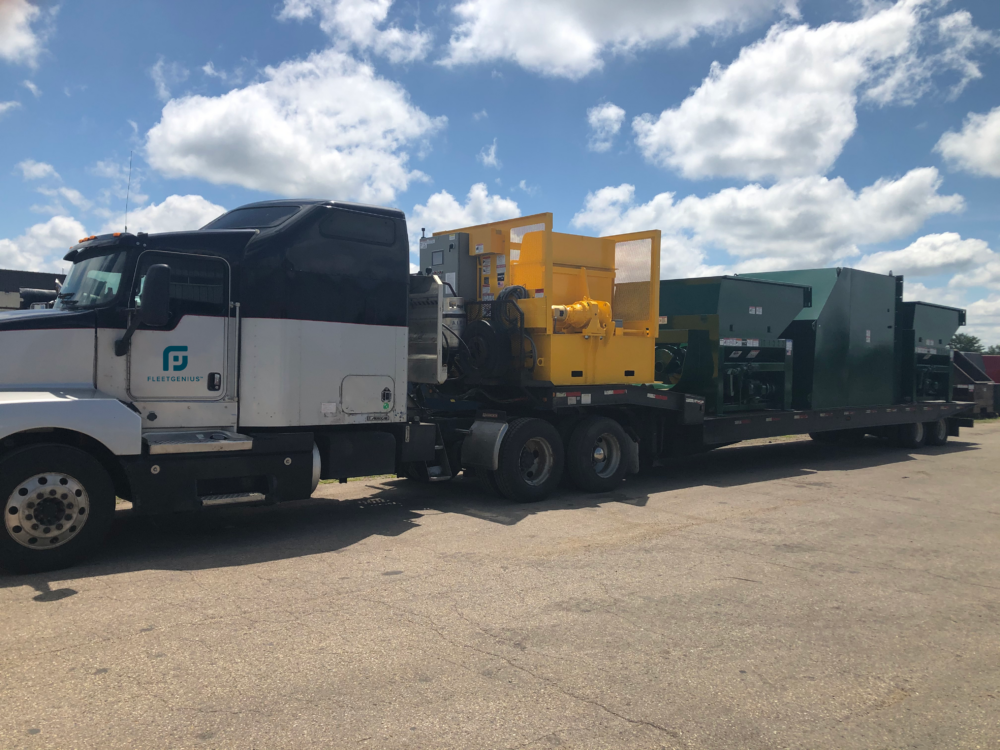Commercial Compactor & Baler Installation Services
- FleetGenius provides comprehensive installation, modification, and relocation services for commercial trash compactors and recycling balers, throughout the United States.
- From coordinating freight to meeting site requirements, we provide a turnkey solution tailored to your needs.
- With custom fabrication, we ensure that each installation is optimized for production and safety, meeting your individual requirements.

Compactor & Baler Installation FAQs
- What kind of electrical service do I need for a compactor?
Electricians please use the below chart as a guide for what type of electrical service is needed for a waste compactor.
MOTOR HP VOLTS LOAD AMPS FUSE MAX SIZE CIRCUIT BREAKER SERVICE DISCONNECT AMPS 3 HP 3/208
3/230
3/46010.6
9.6
4.815
15
1020
20
1530
30
305 HP 3/208
3/230
3/46016.7
15.2
7.630
25
1540
40
2030
30
3010 HP 3/208
3/230
3/46030.8
28
1450
50
2580
70
3560
60
3015 HP 3/208
3/230
3/46046.2
42
2160
60
3090
90
4060
60
3020 HP 3/208
3/230
3/46059.4
54
27100
90
45125
125
60100
100
6030 HP 3/208
3/230
3/46088
80
40150
150
70225
200
100200
200
10050 HP 3/208
3/230
3/460143
130
65250
225
100350
350
150400
400
1003/4 HP 1/120
1/23013.8
6.920
1020
1530
303 HP 1/280
1/23018.7
1730
2545
4030
305 HP 1/208
1/23030.8
2850
4580
7060
6010 HP 1/208
1/23055
50100
90125
125100
100 - What are the installation specifications?
All compactors are installed in accordance with the ANSI Standards Z245.2 for compactor installations and Z245.5 for baler installations.
- What are the Concrete Pad Requirements for Compactors?
The concrete pad requirements for a waste compactor are:
- 6" thick steel reinforce - 3000 psi concrete
- Minimum 10 ft. wide x 5 ft. greater than the combined length of the compactor and container
Common Compactor Installations
FleetGenius can handle any type of compactor installation, no matter how complex. Our most common commercial waste compactor installations include:
- Dock Compactor Installations: These are the most popular types of compactor installations. In a dock compactor installation, the compactor is installed next to a facility’s loading dock. The material most commonly feeds into the rear of the compactor.
- Through-The-Wall Chute Compactor Installations: In a through-the-wall chute installation, a steel chute is fabricated and attached to the charge opening of the compactor, passing through an opening in a wall. Through-the-wall chutes can be utilized to feed into the sides or rear of the compactor.
- Ground Fed Compactor Installations: A ground-fed compactor operates by placing waste directly into the charge opening from ground level, typically outside the facility. With this setup, employees are responsible for transporting the waste to the compactor and lifting or depositing it inside.
Baler Installations
From simple vertical balers to more complex horizontal balers including both manual tie balers and automatic-tie balers; we can do it all. Our most common recycling baler installations include:
- Vertical Baler Installations: Vertical balers are most often installed inside the facility and fed from the ground.
- Horizontal Baler Installations: Horizontal baler installations are more complex and are sometimes accompanied by a conveyor feed system.
Common Compactor & Baler Steel Configurations
Our most common compactor & baler steel configurations for installations include:
- Hoppers: The purpose of a hopper on a waste compactor is to facilitate the safe and efficient loading of waste into the compactor’s charge chamber. They allow for larger quantities of waste to be loaded at once and act as a safety measure by preventing users from reaching directly into the charge chamber, reducing the risk of accidents and injuries.
- Doghouses: The purpose of a doghouse on a waste compactor is to provide an added level of security when feeding a compactor. It typically features a lockable door or doors, which restrict access to the compactor’s interior. This helps prevent unauthorized individuals from dumping waste into the compactor, ensuring that only authorized personnel can use it.
- Walk-On Deck: The purpose of a walk-on-deck on a waste compactor is that it allows employees to load a dock fed compactor without having to leave the building.
- Full Enclosure: The purpose of a full enclosure on a waste compactor is to provide a complete and secure structure around a dock fed compactor. In addition to allowing your employees to feed the machine without having to leave the building, it offers additional benefits such as noise control, weather protection, and improved aesthetics.
- Cart Dumper/Tipper: A cart dumper/tipper is a device designed to assist in the loading of waste into a waste compactor. Its purpose is to lift and tilt waste containers, such as bins or carts, and empty their contents into the compactor’s charge opening leading to increased efficiency and improved safety.
When it comes to compactor installation and baler installation, FleetGenius is the name you can trust. Our nationwide coverage, experienced team, prompt service, and customer satisfaction focus set us apart.


